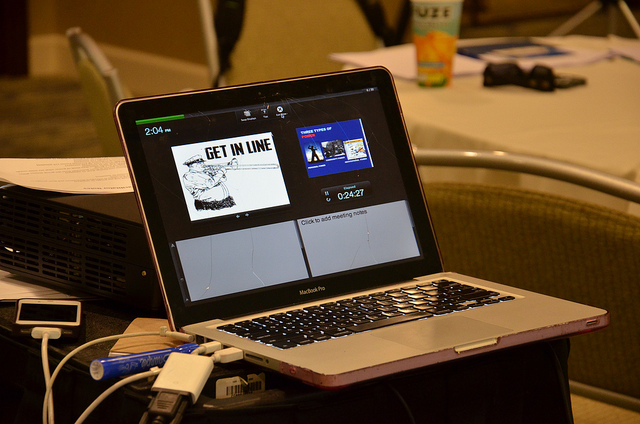Back in 1992, cities across America planned a series of celebrations to mark the five hundredth anniversary of Columbus’s arrival in the Americas.
But the celebrations were subverted by a series of counter-protests organized by a coalition of leftist activist and indigenous rights organizations. The counter-protesters argued, in the words of a popular bumper sticker with which my first newspaper article would begin, “Columbus did not discover the New World, he invaded it.” The article helped bring exposure to the efforts of my first organization, which spent three years challenging some of the most cherished values of American liberalism in the name of a more expansive and inclusive set of values.
What we did not know at the time was that many of the methods through which we organized and sought to bring attention to our cause would probably have been recognizable to contemporaries of Columbus.
The use of printed materials, distributed by hand, in large gatherings, with public speakers, used to raise awareness, would not have been unfamiliar to Martin Luther, the Protestant reformer. Nor for that matter would they have been unrecognizable to America’s Founding Father’s or the later Martin Luther King Jr. in the 50s. But we were the last generation of activists to rely on these time tested tools of modern civil society.
Five hundred years of activism died with the advent of the Internet and virtually nobody said a word.
Back in the 90s, when we wanted to get the word out about something, nothing would happen until a few of us got riled up enough to call together a meeting. At the meeting we would pick an issue and set up another meeting to produce written materials. Then we would sit around together and write up flyers, set up a time to distribute them, sign up more people when we did, then do it all over again.
In the process, we learned how to organize groups of people, how to facilitate meetings, how to argue, how to listen, how to write and how to engage others. When these efforts proved successful, we then had to write proposals, lobby authorities, and prioritize causes.
All of this constituted an on-the-ground training for community leadership and for high political office. And those who learned these skills could be counted on to form part of the backbone of civil society, something which political scientists, following the fall of the Berlin Wall, were telling us had to be developed for democracy to work. Perhaps these were not the exact same skills learned by the Sans-culottes in the French Revolution, but it was easy to imagine that with a couple of years of French under our belts and a good time machine, we could have used those skills to rise to leadership in what was probably the most momentous and definitive modern social movement.
All of this changed when activism went online.
There is little need for communication skills online, little need for group meeting skills, little need to write for a general audience, little need for public speaking, little need to find agreement with others, little need to formulate proposals, little need even to manage bad press. Instead, the online activist is met with a series of binary decisions, to like this or that, share this or that.
The online activist needs to build audience, though. And this is accomplished through some mysterious combination of moral forcefulness, personal engagement, the ability to forge a small pocket of like minded people and that perennial activist skill of dogged persistence. It is a skill set well suited to demagogues, politicians who stir the passions of their audiences through stimulating their most base frustrations. So it should not surprise us that the youngest politicians tend to be the most extreme. Not only must they get their message out online, but many of them learned their political skills online as well.
The end of this sort of activism is the political equivalent of destroying a significant portion of a country’s school system. Politicians, activists, and private citizens are simply no longer learning the skills that made civil society function over the past several hundred years. This does not mean we are not learning new skills that may in the end result in an increasing level of democratic governance. Nor does it mean activists are less effective. In fact, activists now have access to a far more powerful set of social media based organizing tools that make the printing press look a bit like a stone hand axe. And everyone these days seems to at least dabble in activism.
But it is quite possible democracy will increase globally while the quality of democratic participation continues to decline. Democracy may, in other words, degenerate into an undignified and unreasonable battle of extremists, whose identities are deeply tied to their political participation, with no real reasonable center through which we might forge deals and mediate disputes—and yet, we might get more of it globally.
There is nevertheless much we can do to learn democratic skills online.
Perhaps the easiest thing is to engage in more intentional dialogue. This will teach the patience needed to comprehend and respect alternative conceptions of the good life and society. Fact checking is also a highly valuable skill set that we did not learn in the nineties and was probably not learned by generations of our predecessors. The ability to maintain harmony in an unruly online community can teach organizers how to forge broad based coalitions, which might have a greater impact upon policy.
And being online can expose activists to a wider range of views and teach the relativity of our own most cherished values. But the more salient point is that the status quo through which people once learned democratic skills no longer holds and this may be impacting the very foundations of democracy.
Author: Theo Horesh
Editor: Catherine Monkman
Photo: Michele Ursino/Flickr, AFGE/Flickr

 Share on bsky
Share on bsky








Read 1 comment and reply